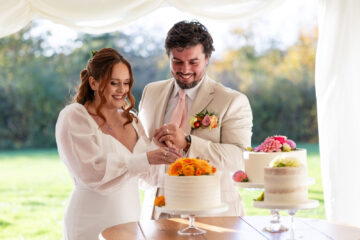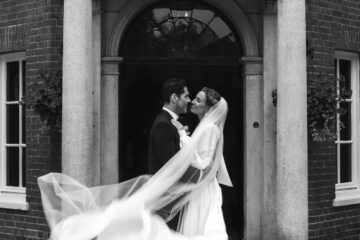Are we losing the art of writing heartfelt, personal wedding speeches without relying on AI for help?

Header image by Northamptonshire wedding photographers Sky Photography
I wonder if we’re being subtly steered towards the use of AI for everything wedding. At the top of almost any Google search result in 2025 is an AI overview. When, out of curiosity, I asked ‘how to write wedding vows‘, Google’s AI threw up a detailed breakdown of what to include, recommending that I ‘write from the heart’ and ‘be authentic’, following up with notes on structure and where to find more inspiration online. Oh, the irony…
At least it stopped short of asking me if I wanted it to help by writing vows for me.
A new survey reveals how couples are using AI for wedding planning, vows and speeches
So this survey is really interesting. Customers of Queensmith say they’re already using AI to plan their weddings, with 55% using AI to help write vows and wedding speeches.
Is it such a big step though, really? After all, we’ve all been searching for these kinds of tips online for a couple of decades, so what’s new?
71% of Queensmith customers said they would consider using AI for their weddings. Of those who used AI to help write their vows, 19% of respondents relied solely on AI to write and edit their vows – that’s still almost one in every five people who are getting married – whilst 53% said they only used it for inspiration.
While a smaller portion relied solely on AI, this survey still implies a shift in attitudes. Claudia Besant at Queensmith raises the question of whether we’re beginning to lose the art of writing heartfelt, personal speeches without relying on AI for help.
Top 10 ways couples are using AI to plan their wedding
- Writing vows & speeches – 55%
- Honeymoon planning – 42%
- Budgeting – 37%
- Theme & décor inspiration – 33%
- Recipe & drink ideas – 27%
- Wedding invitations – 25%
- Outfit ideas – 21%
- Seating arrangements – 19%
- Hashtag/nickname inspiration – 19%
- Finding a venue – 17%
I’m not against AI – but I’m cautious that it could take away some of the authenticity of weddings. If the pandemic taught us anything, it was just how precious human connection is, and that weddings are a microcosm of emotion where the magic lies in gathering all of the most precious people in your world together into one space.
AI used well can save you time with finding a venue (filtering out local places by your list of ‘must-haves’ and narrowing your search options or even broadening your horizons to venues out of your immediate area). It also has the potential to simplify or sterilise the wedding planning experience, depending how it’s used. I love the idea of using AI to think of unusual and different ways to celebrate, which don’t necessarily fit expectations of what weddings ‘should’ be.
But using AI to write personal, heartfelt aspects of a wedding ceremony does worry me. I understand it: it’s daunting to have to stand in front of a crowd of people and speak from the bottom of your heart. But that’s the key: if you speak from the bottom of your favourite search tool instead, it won’t have the same ring.
The main reasons for using AI to write speeches/vows:
- 72% didn’t know where to start or what to say
- 41% wanted to make their speech or vows sound better
- 25% wanted to make them more romantic and poetic
- 9% wanted to make them funnier
- 6% wanted them to sound less cringeworthy
According to Queensmith’s survey, 41% of couples said they used AI because they wanted their vows or speeches to sound better, whether that meant improving the flow, finding the right wording, or polishing their message.
For 25% of respondents, the goal of using AI was to make their words more romantic or poetic, suggesting that AI is seen as a way of adding style and emotion to something deeply personal.
A smaller but still significant group used AI wedding speech generators for more specific writing tweaks: to make their vows or speeches funnier, or to make them sound “less cringe.”
I’d recommend against both of these uses for AI. Romance, poetry, style and emotion aren’t ChatGPT’s best bits. Neither is a sense of humour – and I suspect more ‘cringe’ will come from folks who can spot an AI-generated speech a mile off, than from anything you’d like to say from your heart which you’re a little nervous about.
Why the personal touch is so important at weddings
Let me share something from my perspective as a small business owner. People love people. For me, that means people buy my designs because of me. Connection is everything, and being human and authentic is everything.
For anyone making a wedding speech, the same applies: everyone at the wedding wants to hear your voice, see your genuine smile and even that little bit of nerves that gradually turns to confidence. You want them to feel a little of what you’re feeling. AI won’t tell you that.
As for writing your vows… just be yourself. If you’re desperately worried you won’t get them right, talk to each other and explain how you feel. Your words will mean a million times more if they’re your own words, not something you cajoled out of Silicon Valley.
So are we losing the art of writing from the heart when it comes to weddings?
I don’t think so. What I do think is that AI is trying to convince us that we need it. And we don’t.
We’re not losing the art of communication: we’re being told we should doubt our ability to manage it alone.
As AI grows, it wants to tell us we need it more and more. That’s why it’s important to balance news like this with real thought and debate, from the heart. I believe that some of those 55% of couples who used AI for help with speeches and vows did so because they looked online and found suggestions at the top of search results which steered them in that direction.
But listen: humans can do this kind of thing better than computers. Would you rather sit, drink in hand, listening to words from a machine, or from a person? My vote’s for what that person has to share, always.
Here’s the best advice I can share about making a wedding speech. (If you can’t listen to it right now, bookmark this blog and come back to it later. It will change how you think about everything you have to say.)
Trust in yourself to get this right.
You’ll be fine.



0 Comments